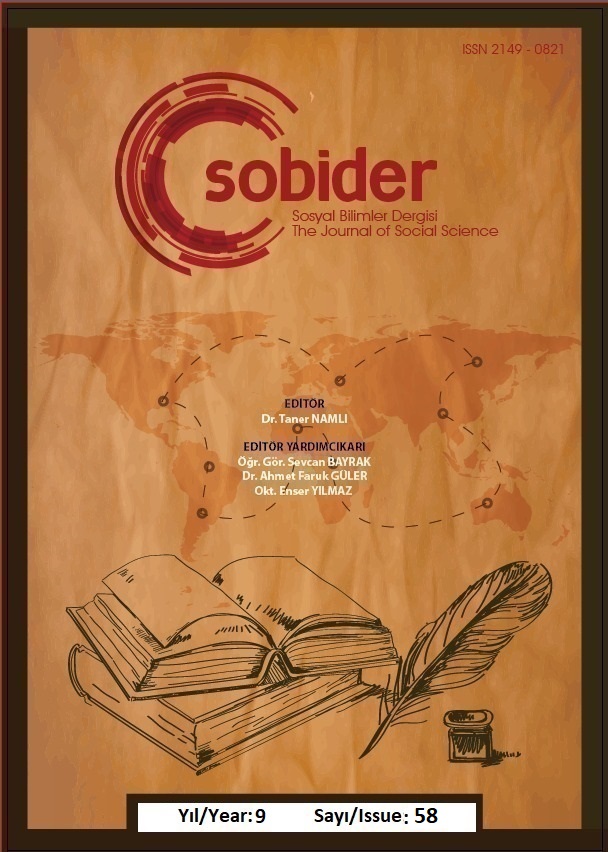Author :
Abstract
Kooperatif yapılar, bir işletme olarak düşünülse de ana hedefin kâr elde etmeme olması yönüyle özel sektör işletme modellerinden ayrılırlar. Kooperatifler bu özellikleri itibariyle yerelin “çok yönlü” kalkınabilmesi açısından önemli alternatif modeller olarak karşımıza çıkmaktadır. Yani kooperatifler, yerel kalkınmaya salt ekonomik açıdan katkı sağlamanın ötesinde sosyal faydaya dönük eğitim, sağlık gibi alanlara yönelik de önemli etkide bulunan girişimlerdir. Bu yönüyle kooperatifler yerel düzeyde insan gücü ve diğer üretim faktörlerini verimli ve planlı kullanabileceğimiz önemli yerel kalkınma aktörleridir.
Kamunun yönetimine ilişkin giderek artan ‘yerelleşme' eğilimi içerisinde yerel yönetimler önemli aktörler haline gelmektedir. Söz konusu yerel yönetimler içerisinde belediyeler özellikle yerel kalkınma açısından ön plana çıkan aktörler olmuştur. Bu doğrultuda kamu yönetimi reformu kapsamında yapılan yasal düzenlemelerle belediyelerin görev ve sorumlulukları genişletilerek yeniden düzenlenmiştir. Belediyeler artık yerel kalkınma noktasında farklı aktörlerle işbirliği içerisinde olan daha dinamik kuruluşlar haline gelmiştir.
Bu değişim süreci içerisinde çalışmamız büyükşehir belediye yönetimlerinin yerel kalkınma stratejileri içerisinde kooperatifler yerel kalkınmaya nasıl katkıda bulunabilir sorunsalı etrafında şekillenmekte olup kooperatiflerin “dengeli kalkınma” açısından oldukça işlevsel olabileceği iddiası da taşımaktadır. Bu amaca yönelik çalışmamızda belediye kooperatif ilişkisi yerel kalkınmaya etkisi bağlamında ele alınmıştır. Çalışmamız kapsamında Hatay’da faaliyet gösteren tarımsal kalkınma kooperatifleri ve Hatay Büyükşehir Belediyesi’ne yönelik nitel sorulardan oluşan bir saha çalışması yapılmış, araştırmada elde edilen bulgular betimsel ve içerik analizi yöntemiyle yorumlanmıştır. Nitel analiz sonuçlarına da dayanarak SWOT analizi yapılmış ve modele ilişkin güçlü ve zayıf yönler ortaya koyulmuştur. Hatay Büyükşehir Belediyesi tarafından başlatılan ve bizim “Hatay Modeli” olarak adlandırdığımız kooperatif belediyecilik ilişkisi tüm boyutlarıyla ele alınmaya çalışılmış ve söz konusu modelimize ilişkin bir dizi öneriler ortaya koyulmuştur.
Keywords
Abstract
Although cooperative structures are considered as a business, they differ from private sector business models in that the main goal is not to make a profit. With these features, cooperatives emerge as important alternative models in terms of the "multi-dimensional" development of the local. In other words, cooperatives are initiatives that not only contribute to local development in economic terms, but also have a significant impact on areas such as education and health for social benefit. In this respect, cooperatives are important local development actors that we can use manpower and other production factors efficiently and in a planned manner at the local level.
Local governments are becoming important actors in the ever-increasing "localization" trend regarding public administration. Among these local governments, municipalities have been prominent actors, especially in terms of local development. In this direction, the duties and responsibilities of municipalities have been expanded and rearranged with the legal regulations made within the scope of the public administration reform. Municipalities have now become more dynamic organizations in cooperation with different actors at the point of local development.
In this process of change, our work is shaped around the problem of how cooperatives can contribute to local development within the local development strategies of metropolitan municipalities, and it also claims that cooperatives can be quite functional in terms of "balanced development". In our study for this purpose, the relationship between the municipality and the cooperative is discussed in the context of its impact on local development. Within the scope of our study, a field study consisting of qualitative questions about agricultural development cooperatives operating in Hatay and Hatay Metropolitan Municipality was conducted, and the findings obtained in the research were interpreted with descriptive and content analysis method. Based on the qualitative analysis results, a SWOT analysis was made and the strengths and weaknesses of the model were revealed.The cooperative municipality relationship, which was initiated by Hatay Metropolitan Municipality and which we call the “Hatay Model”, has been discussed in all its dimensions and a series of suggestions have been put forward regarding our model.
Keywords
- Babaoğlu, C., Kocaoğlu, M. (2017), “Kentli Sığınmacılar Meselesi ve Belediyeler”, Türk İdare Dergisi, S.485,497-516.
- Bayrakçı, E., (2019), Yerel Yönetimler Ders Notları, Konya: Dizgi Ofset.
- Bilgin, M., (2002), Yerel Yönetimlerin Bölgesel Kalkınmadaki Etkinliği: Göller Bölgesi Uygulaması, Süleyman Demirel Üniversitesi İktisadi ve İdari Bilimler Fakültesi Dergisi, 7 (2) 313-330.
- Casagrande C., ( 2004), “Yerel Birimlerin Yerel Gelişmedeki Rolü: Fransa Örneği”, Yerel Kalkınmada Belediyelerin Rolü (Uluslararası Sempozyum), İstanbul.
- Çetin, M., (2006), Yerel Kalkınma Ajansları, Ege Akademik Bakış Dergisi, 6 (2) 127-139.
- Darıcı, B. (2007), Yerel Kalkınma’da Küresel Yaklaşımlar ve Türkiye’nin Konumu . Karamanoğlu Mehmetbey Üniversitesi Sosyal Ve Ekonomik Araştırmalar Dergisi , 2007 (3) 215-221.
- Eroğlu, H.T., (2010), “Sürdürülebilir Yerel Kalkınma ve Kent Konseyleri”, Dumlupınar Üniversitesi Sosyal Bilimler Dergisi, 26 (2) 44-55.
- Geray, C., (2014), Kooperatifçilik, Ankara: Nika Yayınevi.
- Göymen, K. (2010), “Yerel Kalkınma Önderi ve Paydaşı Olarak Belediyeler”, Türkiye’de Yerel Yönetişim ve Yerel Kalkınma, İstanbul, Boyut Yayıncılık.
- Gülpak, M., (1997), Türkiye’de Kooperatifçilik Hareketinin Gelişimi ve Bu Gelişmede Ahmet Hamdi Başar’ın Yeri ve Rolü. Yayınlanmamış Yüksek Lisans Tezi. Marmara Üniversitesi.
- Mülayim, Z.G., (1999), Kooperatifçilik, Yetkin Yayınları: Ankara.
- Nel, H., (2001), “A Project Management Approach to the Implementation of Development Programmes within the Local Government Sphere: An Emprical Analysis” Development Southern Africa 18 (5) 605-624.
- OECD (2019), Principles on Urban Policy and on Rural Policy, OECD Regional Development Ministrial, Athens, pp.1-8.
- Osmanağaoğlu, İ., (2014), Toplumcu Belediyecilik, Ankara: Memleket Yayınları.
- Sayın M. (2006), Yerel Ekonomİk Kalkınma Modelİ Olarak GAP-GİDEM Projesi.
- Yıldırım, U.D., (2019), “ Belediyeler ve Kooperatifler Ekseninde Türkiye Tarımında Alternatif Kamusallık Deneyimleri”, (Der. F.S. Öngel ve U.D. Yıldırım), Krize Karşı Kooperatifler, NotaBene Yayınları, İstanbul.





